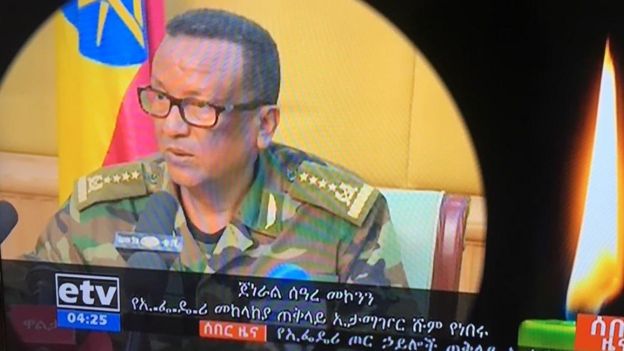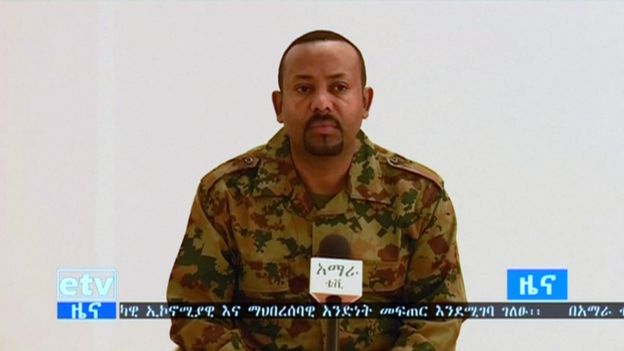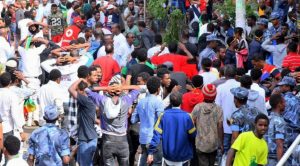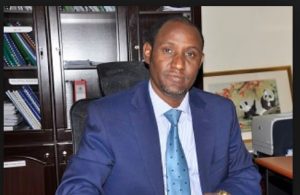A Special Tribute to Victims of a Terrorist Attack in Addis Ababa, Ethiopia on June 23, 2018 and Amhara Region on June 22, 2019
Today, high level iconic leaders of Amhara kilil (region) were shot by their own brothers (colleagues). Some were killed and others wounded. The man who was coordinating the (military) operation against the coup plotters, our beloved and most respected armed forces chief of staff Seare Mekonen was killed by the hired hitmen of the coup plotters. We have put the situation in Amhara kilil under complete control. It was a coup attempt that did not even last an hour. It was a complete failure. We are pursuing those who managed to escape arrest… P.M. Abiy Ahmed, televised statement, June 22, 2019.
——-
Let us separate private individuals from ethnic groups. Let’s separate the thorns from the rose flowers. Because of one crooked tree, we must not destroy the whole forest…
We will always remember today’s martyrdom as the price we paid for Ethiopian love, Ethiopian peace, Ethiopian unity and Ethiopian reconciliation. We earned this very day with great sacrifice.
It is a day we got by losing so many of our people. It is a day we have learned once again what we got through sacrifice and a day we did not expect to get without sacrifice. Regardless, what I want to announce to my Ethiopian brothers and sisters is that love conquers all.
Forgiveness conquers all. To kill is to be defeated. To kill is to bear shame.
For anyone to work and thwart and destroy the joy of a country is a sign of smallness. But we Ethiopians are not small. We are a great people.
— P.M. Abiy Ahmed, rally speech and televised statement, June 23, 2018
![]()
![]()
At the scene of the terrorist attack in Mesqel Square, Addis Ababa on 6/23/18
As I remembered the terrorist victims of June 23, 2018, another terrorist attack took place on June 22, 2019.
I had prepared this tribute for release on June 23, 2019 when I heard news of an attempted coup in the Amhara region of Ethiopia and the assassination of Chief of General Staff Saere Mekonen on June 22, 2019.
I was deeply saddened by the news.
Is it déjà vu?
Someone trying to take power by the barrel of the gun, again? Almost exactly a year to the day?
This was intended to be my memorial tribute to those who died and were wounded on June 23, 2018 in a terrorist attack at Mesqel Square, Addis Ababa.
Today, it is also my memorial tribute to those who died on June 22, 2019.
![]()
![]() H.E. Dr. Ambachew Mekonnen, Amhara Region President
H.E. Dr. Ambachew Mekonnen, Amhara Region President
I honor the service and sacrifices of Amhara region president H.E. Dr. Ambachew Mekonnen, armed forces Chief of Staff General Saere Mekonnen (no relation), Maj. General Gezai Abera (ret.), Ato Ezez Wassie, Amhara regional government advisor and others who were wounded in the abortive coup. My deepest condolences to their families.
![]()
![]() Armed Forces Chief of Staff General Saere Mekonnen
Armed Forces Chief of Staff General Saere Mekonnen
I remember…
I remember June 23, 2018 just like June 22, 2019.
I was in Washington, D.C. at the Architect Hotel. A CNN reporter popped on the TV screening. “Breaking news. An explosion at a rally in Addis Ababa… 156 people injured, one fatality.”
I can say I was present at Mesqel Square on June 23, 2018. I cannot say I was completely surprised by the terrorist attack.
Still, I was angry as were millions of others who wanted to act out their outrage.
Those who planned, financed and coordinated the terrorist attack on June 23, 2018 did not aim to kill one individual. They wanted to kill a whole nation in a civil war.
Those who planned, financed and coordinated the terrorist attack on June 23, 2018 intended to abort the birth of a new and free Ethiopia. They wanted to forever seal Ethiopia in the womb of ethnic apartheid.
But on June 23, 2018, ethnic apartheid died miserably and was buried deep in the trash heap of history. But the Forces of Darkness wanted to go out with a bang at the funeral of ethnic apartheid.
Nearly 160 innocent people became victims of the terror of the Forces of Darkness.
All Ethiopians owe a heavy debt of gratitude to these martyrs of freedom who died or were injured on June 23, 2018 at Mesqel Square.
They are the unknown and unsung heroes who deserve our eternal respect and appreciation.
I salute them all for their heroic sacrifices.
On that day, they were the thin red line between civil peace and civil war.
If things had gone the other way that day, I shudder to think how many hundreds of of thousands of innocent people would have died in mindless acts of vengeance.
I learned a great lesson on June 23, 2018.
We must not lose faith in our fellow Ethiopians. Ethiopia is an ocean. If a few drops of the ocean are dirty, the ocean does not become dirty. We must learn to “separate the thorns from the rose flowers.”
Ethiopian Days of infamy
Ethiopia has seen many dark days that will forever live in infamy.
November 24, 1974. A day that will forever live in infamy.
Junta leader Mengistu Hailemariam ordered the massacre of 60 officials (Mengistu Massacres) of the imperial government of H.I.M. Haile Selassie. That massacre marked the era of “Red Terror” in Ethiopia.
June 8, 2005. November 1 to 10, 2005. November 14-16, 2005. Thirteen days that will forever live in infamy.
Following the 2005 parliamentary election, Tigrean People’s Liberation Front (TPLF) Don and capo di tutu capi (boss of all bosses) Meles Zenawi declared a state of emergency and ordered his troops to shoot-and-ask-questions-later. In the Meles Massacres, 193 unarmed protesters were killed and 763 wounded.
October 2, 2016. A day that will forever live in infamy.
Under the leadership of TPLF puppet prime minister Hailemariam Desalegn, TPLF troops opened fire indiscriminately on crowds attending one of the most important cultural and spiritual events in Ethiopia. The Irreecha Massacres resulted in the deaths of an estimated 700 people.
June 23, 2018. A day that will forever live in infamy.
An terrorist dressed in a police uniform unsuccessfully attempted to throw a grenade at a rally killing at least two persons and wounding 156. “Nine Addis Ababa police commission officials including the deputy Addis Ababa police commissioner” were arrested.
June 22, 2019. A day that will forever live in infamy.
Certain individuals intent on effecting a coup d’etat killed Amhara region president H.E. Dr. Ambachew Mekonnen, armed forces Chief of Staff General Saere Mekonnen (no relation), Maj. General Gezai Abera (ret.), Ato Ezez Wassie, Amhara regional government advisor and others.
Power does NOT grow out of the barrel of the gun — Days of the gun are over and gone. Violence is the weapon of losers!
Mao Zedong, the father of the People’s Republic of China was dead wrong when he proclaimed, “Every Communist must grasp the truth, ‘Political power grows out of the barrel of a gun.’ Our principle is that the Party commands the gun, and the gun must never be allowed to command the Party.”
The only thing that grows out of the barrel of a gun is death and destruction.
But such has been the slogan of the Tigrean People’s Liberation Front and its leaders.
Meles Zenawi’s favorite taunt to the opposition was, “If you want power, get it like we did. Go to the bush and fight your way back.”
For 27 years, the TPLF leaders enforced their cruel and brutal rule in Ethiopia with the barrel and butt of the gun.
For 27 years, the TPLF succeeded in their propaganda that they can be removed from power only through brute force, the barrel of AK-47s.
For 27 years, the TPLF brayed, neighed and cackled about how powerful they were with the gun. They boasted, “We made the mountains shake, rattle and roll with our guns!”
Ha!
In the end, the TPLF was defeated without a single shot being fired.
In the end, the TPLF packed up and stealthily skipped town like a family of gypsies.
In the end, the TPLF is holed up under a rock somewhere to avoid detection.
Of course, I always knew in the end the TPLF would prove to be a Beast with feet of clay.
In 2013, I proclaimed the TPLF is not to be feared. “When gazed upon, the TPLF appears awesome, formidable and infinitely powerful. It has guns, tanks, rockets, planes and bombs. Though the T-TPLF has legs of iron, its feet are made of clay.”
In the end, the TPLF was defeated not by guns, tanks and war planes.
The TPLF’s guns, tanks and rockets were defeated through mass civil disobedience and peaceful resistance.
In 2009, I told the TPLF the people of Ethiopia united can never be defeated.
In 2013, I warned the TPLF to stop killing, jailing and torturing people or they will seal their doom in the trash heap of history.
In 2018, the TPLF was doomed just like I predicted!
In 2018, the young people of Ethiopia, Ethiopia’s Cheetahs, were united against TPLF oppression, brutalization, exploitation and apartheid rule. My prophesy came to pass!
In 2019, the TPLF is finds itself in the trash bin of history hoping to escape legal accountability for its crimes, corruption and human rights violations.
My way or the secession highway?
Today, TPLF capo and casanova Debretsion Gebremichael runs around frothing at the mouth, “It is my way or the secession highway.”
We have heard that wolf cry for decades.
The TPLF took up guns in the early 1970s to secede from Ethiopia and establish an independent “Republic of Tigray”.
Then, lo and behold, they found a bottomless gold mine called Ethiopia.
For 27 years, the TPLF gold diggers literally ripped out all the gold in Ethiopia.
Now, they think there is gold at the end of the rainbow of secession.
The TPLF leaders could learn a lesson from the fable of King Midas who wanted to change everything he touched to turn into gold. He learned to be careful what to wish for.
“Be careful what you wish for, it might just come true”, Debretsion and TPLF!
Hear! Hear!
“All that glitters is not gold.”
That includes black gold (oil) Debretsion thinks he can squeeze out of rocks.
If Debretsion and his TPLF gang think there is going to be a pot of gold at the end of the rainbow of secession, I got news for them.
They will find only fool’s gold.
They will find nothing but privation, hardship, misery, sorrow and suffering.
That is a FACT!
Debretsion and his TPLF should be forewarned: Those who seek gold in secession should beware they will only find El Dorado.
We must be like the foolish old man who removed the mountains
Mao Zedong was right on the money when he invoked an ancient Chinese fable called “The Foolish Old Man who Removed the Mountains” to teach his people.
The Foolish Old Man had a house that faced the two great peaks, Taihang and Wangwu (metaphorically representing feudalism and imperialism), which obstructed his view.
The Foolish Old Man got his sons and began digging up the two mountains.
A Wise Old Man who was watching remarked, ‘How silly of you to do this! It is quite impossible for you to dig up these two huge mountains.’
The Foolish Old Man replied, “When I die my sons will carry on; when they die, there will be my grandsons and then their sons and grandsons, and so on to infinity. High as they are, the mountains cannot grow any higher and with every bit we dig, they will be that much lower.
The Foolish Old Man and his sons continued to dig everyday firm in their conviction that in the end they will clear the mountains. God was moved by this, and he sent down two angels who carried the mountains away on their backs.
The two mountains we must clear in Ethiopia
Today, two big mountains lie like a dead weight on the people of Ethiopia.
One is a mountain called Tribalism.
It goes by many other names: ethnic chauvinism, ethnocentrism, ethnic apartheid, ethnic federalism, communalism, sectarianism and clannism.
The other consist of a mountain called Underdevelopment with triple peaks called poverty, disease and illiteracy.
If Ethiopia’s children stand together and dig together in good will and common purpose, we can clear out these two mountains in a single generation.
If we can’t clear them, our grandchildren, great grandchildren can clear them out.
How do we remove the mountains of tribalism and underdevelopment?
Before we can tackle the job of removing the mountains of tribalism and underdevelopment, we must arouse the political consciousness of the entire people of Ethiopia with Dr. Martin Luther King, Jr’s message: “We must all learn to live together as brothers or we will all perish together as fools.”
My adaptation of Dr. King’s message is this: We must dig together to clear away the twin mountains of tribalism and underdevelopment that are a dead weight on Ethiopia with the reckless abandon of the Foolish Old Man and his sons or perish like damned fools.
WE can clear out the mountain of tribalism and underdevelopment only when we work together like fingers on our hands and dig together like a cete of badgers.
I use the pronoun “We” in a specific way.
I mean WE as in “We, the People of the United States”.
WE as in “We the people of Ethiopia”, NOT as the so-called nations, nationalities and peoples in Ethiopia. (I have discredited the nonsense about “nations, nationalities and peoples” in Ethiopia.)
WE as in the united people of Ethiopia, NOT as the disconnected people of the Kililistans of Ethiopia.
When I first came to America nearly 50 years ago, I attended a foreign student’s orientation at my college and was told America is a melting pot of races, ethnicities, cultures, nationalities, etc.
That was the first time I heard Benjamin Franklin’s saying, “United we stand, divided we fall”.
I learned about the motto of the United States, “E pluribus unum” (out of many, one).
I learned about the pledge of allegiance, “one Nation under God, indivisible, with liberty and justice for all”.
I believe there is one indivisible Ethiopian nation that is home to diverse communities. The most beautiful garden has flowers of all varieties with different sweet fragrances.
I believe Ethiopia must be a nation where each citizen is entitled to equality, liberty and justice regardless of ethnicity, religion, race, color, gender or age.
I should like to think of myself the Foolish Old Man digging at the two mountains Mao Zedong was metaphorically talking about.
I have been digging and digging for the past 14 years, not with a hoe and shovel but with my pen and computer keyboard.
Today, the Foolish Old Professor is digging right along the most dynamic Ethiopian Cheetahs (young people) to clear out the mountains of tribalism and underdevelopment.
But the Foolish Old Professor has the easiest job.
All he has to do is carry water for the young Cheetahs who do all of the heavy lifting and heavy digging in building the New Ethiopia.
Medemer: The roadmap out of the valley of tribalism and underdevelopment
Ethiopians have an old saying. “If spiders’ web could be made into twine, it could tie up a lion.”
If thousands of spiders could come together for a common purpose and work together, they could snag and bag that big ole king of the jungle.
“Medemer” is the political translation of the old spider metaphor.
Medemer is our roadmap out of the mountainous wilderness of tribalism, poverty, disease and ignorance.
Last August, I told Ethiopians the only question they face is Medemer or not Medemer.
This past October, I formulated an equation for Medemer.
![]()
M(edemer)= Sc(social capital) x Ac2 (active citizens)
Where Sc is social capital defined as the networks of relationships among people who live and work in a particular society, and
Ac is defined as the number of people getting involved actively in their local communities and democratic governance at all levels (from towns to cities to nationwide activity).
In more philosophical terms, Medemer is based on the principle, “Without you, there is no me. Without me, there’s no you. We must come together as a fist.”
The essence of Medemer is that all Ethiopians are tied together in the single garment of destiny.
In other words, without Oromos, there are no Amharas; without Amharas, there are no Tigreans; without Tigreans there are no Somalis; without Somalis, there are no Sidama; without Sidama, there are not Woleyita; without Woleyita, there are no Afari; without Afari, there are no Harari; without Harari, there are no Anuak; without Anuak, there are no Gurage and on and on.
When we include everyone into the whole fabric of Ethiopia — that single garment of destiny Dr. King talked about — undivided by ethnicity, religion, language, etc., then we know we have attained greatness in Ethiopia.
Without each other in Ethiopia, there is only “the other”.
The “other” who is the enemy.
The “other” who must be annihilated.
The “other” who is a stranger among us, even though in every way s/he is one of us, our flesh and blood.
In Ethiopia, H.E. Prime Minister Dr. Abiy Ahmed has chosen the path of Medemer.
Every day, he preaches the gospel of inclusiveness, “We and Us.”
For PM Abiy, “We and Us” include our neighbors who border us, all Africans and all people of the world.
Medemer requires passionate and dedicated exertions by individual Ethiopians who are willing to fight the insurgent and primitive forces of hate, tribalism and division.
The martyrs of June 23, 2018 and Ethiopia’s road map for the future
On June 23, 2018, I trembled in cold sweat alarmed Ethiopia was inching – plunging — towards a creeping civil war.
On June 23, 2019, I am filled with the confidence and conviction that despite bumps in th road, we have a clear road map for the future.
Ethiopia was saved on June 23, 2019 because a grenade intended for one man was deflected and the pain and suffering of 110 million people was borne by 158 innocent individuals.
Ethiopia shall rise today because it has young leaders who are willing to pay the price for liberty and democracy.
The Forces of Darkness behind the June 23 terrorist attack believed they could stop the peaceful change by killing the leaders brought forward by the blood, sweat and tears of the young people of Ethiopia.
The Forces of Darkness behind the June 22, 2019 coup also believed could stop the peaceful change by killing the leaders brought forward by the blood, sweat and tears of the young people of Ethiopia.
But the die is cast. Neither grenades, guns nor tanks can stop Ethiopia’s march towards democracy.
Notwithstanding the gripes and complaints of the naysayers and nitwits, Ethiopians today live in civil peace without fear of civil war. They are enjoying the benefits of civil government, civility, civic reconciliation and the rule of law.
But to make the sacrifices of the 158 people, the thousands of others who paid with their blood, tears and sweat lasting and durable and the leaders who paid the ultimate sacrifice, we must all come together and do our share.
We must renounce violence.
If we must fight, let’s fight with our ideas.
Let’s make the hearts and minds of the people of Ethiopia our battlegrounds. .
In my very first major commentary in 2006 after I joined the Ethiopian human rights movement entitled “Awakening Giant”, I wrote:
We prove the righteousness of our cause not in battlefields soaked in blood and filled with corpses, but in the living hearts and thinking minds of men and women of good will.
In the worst days of TPLF rule — during the days of the Meles Massacres—I never advocated the use of violence to remove the TPLF.
Many laughed at me as naïve and idealistic. They said the ONLY way to get rid of the TPLF was through armed struggle.
I never stopped telling anyone who cared to listen or read my commentaries, the only way to get rid of the TPLF is through nonviolent political action, noncooperation and resistance.
I was proven right!
I was always proud to call myself a “utopian Ethiopian”.
I realized long ago violence is a convenient altar for the power hungry and thirsty to sacrifice the blood of innocent people so they can seize power.
I realized long ago violence is a never-ending cycle. Violence solves nothing. Hate is the cradle of violence.
I know violence will remain a political tool as long as the love of power reigns supreme over the power of love.
On June 23, 2018, those who planned, financed and coordinated the terrorist attack believed they can stop the change with violence, murder and assassinations.
On June 22, 2019, those who planned, financed and coordinated the coup believed they can stop the change with violence, murder and assassinations.
They all failed!
I shall always remember June 23, 2018.
I shall always remember June 22, 2019.
There is an eternal truth we must all accept: Violence ultimately destroys those who perpetuate violence.
For it is written:
The wicked draw the sword and bend the bow
to bring down the poor and needy,
to slay those whose ways are upright.
But their swords will pierce their own hearts,
and their bows will be broken.
Let those who have violence and hate in their hearts take notice!
The post June 23, 2018; June 22, 2019: Dates Which Will Live in Infamy in Ethiopia appeared first on Satenaw: Ethiopian News & Breaking News: Your right to know!.
 The full genetic structure of Ethiopians against other Africans. It is clear that Sandawes were from Ethiopia though they now are considered from the jungle simply because they speak click language. Most Ethiopian share three major bloods: Levant (France), Ari and one unknown that seems indigenous to Ethiopia (the one shared with Maasai in larger load. Most Ethiopians lack West African blood as can here be seen in Yoruba or YRI but Anuak and Gumuz do. Afar, Amhara Tigray and Oromo are undifferentiated. Somali with a very slight difference. The two Somali: Ethiopian and the Somali land indeed are exactly the same. Yet the blood composition is exactly the same as the rest like Amhara, Tigray, Oromo, and Afar. This is a clear evidence that linguistic variation does not go with the actual genetic makeup.
The full genetic structure of Ethiopians against other Africans. It is clear that Sandawes were from Ethiopia though they now are considered from the jungle simply because they speak click language. Most Ethiopian share three major bloods: Levant (France), Ari and one unknown that seems indigenous to Ethiopia (the one shared with Maasai in larger load. Most Ethiopians lack West African blood as can here be seen in Yoruba or YRI but Anuak and Gumuz do. Afar, Amhara Tigray and Oromo are undifferentiated. Somali with a very slight difference. The two Somali: Ethiopian and the Somali land indeed are exactly the same. Yet the blood composition is exactly the same as the rest like Amhara, Tigray, Oromo, and Afar. This is a clear evidence that linguistic variation does not go with the actual genetic makeup. Acknowledging the interruption for the first time, Cherer Aklilu Shaffo, the Executive Director of Ethiopia’s lone telecoms provider, told CNN the company would credit customers for services that were affected during the shutdown.
Acknowledging the interruption for the first time, Cherer Aklilu Shaffo, the Executive Director of Ethiopia’s lone telecoms provider, told CNN the company would credit customers for services that were affected during the shutdown.



 “This, coupled with industry-leading reliability and maintainability,
“This, coupled with industry-leading reliability and maintainability,  ︎
︎ ︎
︎




 Vision Ethiopia is a 501 (c) (3) nonprofit organization incorporated in Washington, D.C. EIN 81-0729204
Vision Ethiopia is a 501 (c) (3) nonprofit organization incorporated in Washington, D.C. EIN 81-0729204






![Turkey's opposition set to win rerun of Istanbul's mayoral vote Supporters of the main opposition Republican People's Party (CHP), celebrate in Istanbul, Turkey [Cansu Alkaya/Reuters]](http://www.aljazeera.com/mritems/imagecache/mbdxxlarge/mritems/Images/2019/6/23/62f576ebaf1047d9984e9beea856c7fb_18.jpg)
 A spokesman for Ethiopia’s prime minister told The Associated Press that the army chief, Gen. Seare Mekonnen, had been shot dead at his residence in the capital, Addis Ababa, by his bodyguard. He said a retired army general visiting the army chief at the time had also been killed in the same attack late on Saturday.
A spokesman for Ethiopia’s prime minister told The Associated Press that the army chief, Gen. Seare Mekonnen, had been shot dead at his residence in the capital, Addis Ababa, by his bodyguard. He said a retired army general visiting the army chief at the time had also been killed in the same attack late on Saturday.



 H.E. Dr. Ambachew Mekonnen, Amhara Region President
H.E. Dr. Ambachew Mekonnen, Amhara Region President
 Armed Forces Chief of Staff General Saere Mekonnen
Armed Forces Chief of Staff General Saere Mekonnen

 It is a well-established fact that Egypt has been “the behind the curtain” organizer, financer, and leader of the instabilities Ethiopia has been experiencing over the last nine years. Same is also true on the current instabilities of Sudan where Egypt and its “de facto colony Eretria” are jointly working to put their puppet government in Sudan and destroy the Ethiopia-Sudan alliance established by the late PM Meles and President Omar al-Basher.
It is a well-established fact that Egypt has been “the behind the curtain” organizer, financer, and leader of the instabilities Ethiopia has been experiencing over the last nine years. Same is also true on the current instabilities of Sudan where Egypt and its “de facto colony Eretria” are jointly working to put their puppet government in Sudan and destroy the Ethiopia-Sudan alliance established by the late PM Meles and President Omar al-Basher. How true the saying, “There is no fool like an old fool.”
How true the saying, “There is no fool like an old fool.” History and religion converge at the Holy Trinity Cathedral in Ethiopia’s capital, Addis Ababa.
History and religion converge at the Holy Trinity Cathedral in Ethiopia’s capital, Addis Ababa. The Holy Trinity Cathedral Church.
The Holy Trinity Cathedral Church. Inside the Holy Trinity Cathedral church.
Inside the Holy Trinity Cathedral church. Sylvia Pankhurst in 1942 after Ethiopia’s liberation.
Sylvia Pankhurst in 1942 after Ethiopia’s liberation. The tombs of Sylvia Pankhurst and her son Richard.
The tombs of Sylvia Pankhurst and her son Richard. For almost three decades Ethiopia’s federal structure – enshrined in the country’s
For almost three decades Ethiopia’s federal structure – enshrined in the country’s 



 Masquerading under the name of “Ethiopian People Democratic Revolutionary Front” (EPRDF), the Tigray People Liberation Front (TPLF) has been dominating the Ethiopian power structure using handpicked representatives for Amhara (ADP-Amhara Democratic Party), Oromo (ODP- Oromo Democratic Party), and Southern people (SEPDM). For nearly three decades since 1991, TPLF reigned by pitting the ADP and ODP, against each another. It portrays itself as beacon of stability and a guarantor of the constitution in which the Amhara had never participated and the Oromos were pushed aside.
Masquerading under the name of “Ethiopian People Democratic Revolutionary Front” (EPRDF), the Tigray People Liberation Front (TPLF) has been dominating the Ethiopian power structure using handpicked representatives for Amhara (ADP-Amhara Democratic Party), Oromo (ODP- Oromo Democratic Party), and Southern people (SEPDM). For nearly three decades since 1991, TPLF reigned by pitting the ADP and ODP, against each another. It portrays itself as beacon of stability and a guarantor of the constitution in which the Amhara had never participated and the Oromos were pushed aside.